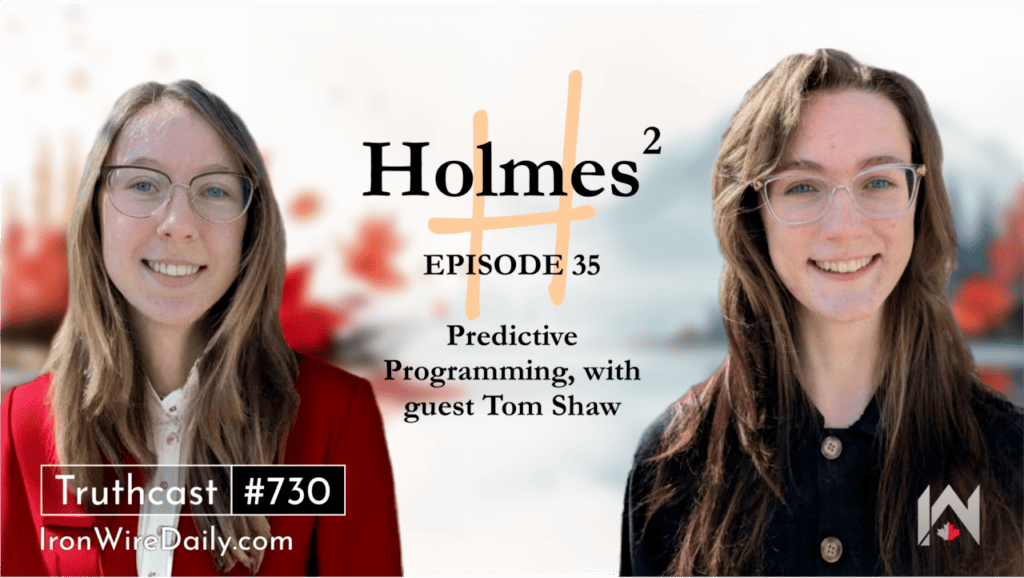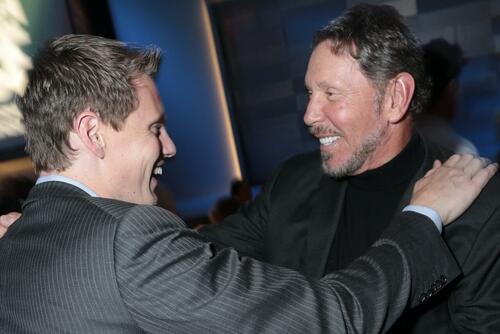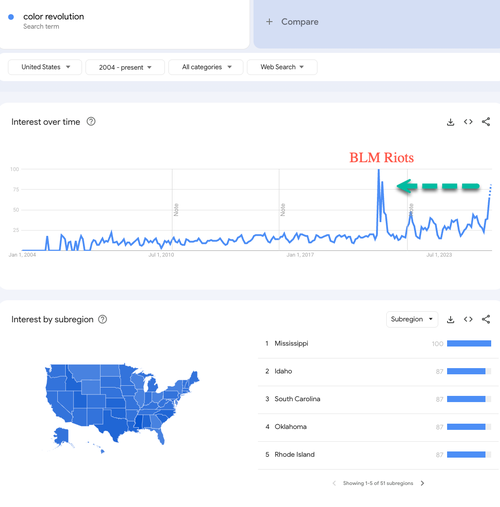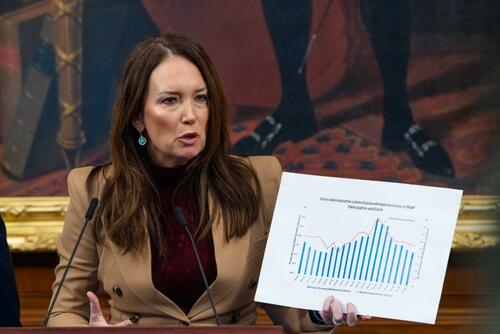Episode 9: “Questioning Mainstream Assumptions”
Madison and Maycee Holmes
Want more Holmes?
Find them on Substack, Rumble and Youtube
You can also contact the Holmes sisters directly at Connect@at-home-with-holmes.com
3 Comments
Leave a Comment Cancel Reply
You must be logged in to post a comment.
(0:00 - 0:07) Hi everybody, I'm Madison Holmes. And I am Maycee Holmes. And you're watching Holmes Squared. (0:08 - 6:56) Maddie just having to unmute her microphone. Yeah, so we avoid an echo because this is how a beginner studio looks like, but today we have somebody very special to us. Who is this? This is Matthew Ehret, the man, the myth, the legend, who we have been raving about in literally every episode of Holmes Squared, his face. Maddie said we should introduce him as our favorite historian. So I will gladly do that. He's an historian and he's also a journalist. But I think that today, like there's so much that Matthew can talk about and what it is that we would love to ask him. But I think today we wanted to give the audience of Iron Wire Daily just an introduction of who in the heck Matthew is. So yeah, Manny, do you want to? Do I want to say anything else? Yeah, we have a lot of topics lined up, especially for his big, big brain. But to start, he is a human being. And since we always go on about the brain and the hemispheres, let's delve into just the background and what makes this man tick. That way, everybody watching, before he starts mind blowing everybody and setting off their neuroticism, as me and Macy would say in our household, before we start getting into some different psyops truths that we and he has uncovered during his especially Canadian history journey, we just want to know what's what kind of started him on this journey. So Matthew, what's your story, man? You guys have a fun introduction. That was fun. Well, thank you. It's a pleasure to be here. And I know we only have like 30 minutes. I'll try to be as brief, but you all know me and I'm kind of a context guy. So it's kind of rein me in if you feel like I'm going off the rails with too much context. What makes me tick? Well, I guess, you know, you could say I write a lot of books. I I've written a number. You guys have a ton. I think you have all of them, actually. And it's kind of cool that you have so many books. And what I guess got me on my journey and shook me out of my normyism was that way back 2004. Now it's quite some time. I was a student. I was I was in university and I was I was working with a team of fellow students on an assignment to put together a 9-11. And for me, that was something that I kind of took for granted. I was going along with common, you know, mainstream narratives about what caused that to happen. What was that all about? I wasn't much of a critical thinker. You know, I didn't I was going along with the assumption that my society was run the way it's assumed. You know, governments are corrupt. Corporations are a little over are very overblown, but it's it's making things kind of work. And there's no nefarious agendas or intentions that I really was aware of beyond that, beyond the general label of corruption is bad. You know, it sucks. But then when I started digging in a little bit to the 9-11 question and I encountered some alternative narratives by researchers who had done a fantastic job showcasing that the official story of a dude in a cave carrying out this very elaborate operation, which required the entire coordinated shutdown of NORAD the morning that it happened, it required a number of things, including assumptions, absurd assumptions that I didn't even realize I had in my mind, like that three buildings on that day had to go down with only two two planes hitting them. I didn't know about that third building. So things like that really got under my skin in the course of that research. And I couldn't look away. And so I found myself obsessing increasingly about trying to piece together, well, what must also be true if that's if that was a lie? What else? What must be the better story that accounts for why my society's all messed up and what brought us here? So that sort of made put me on a new journey. I guess my identity became rewired increasingly towards truth. And I found myself working as a political activist for a number of years starting in 2006, when I encountered a Canadian branch of the Lyndon LaRouche organization, which, you know, had had ideas, many of which I disagreed with many of that I did agree with. But overall, what I saw in that organization was an intention for solutions that I didn't see anywhere else and ideas and concepts about our deep history that accounted for paradoxes that no one else could account for. And so I decided, well, these ideas are good enough to be fought for. And I decided to give that make that my focus, which I did for about 20 years, 20, 10 years as a full-time volunteer. And in that course of that time, I spent a lot. I got to focus a lot, both as a full-time political organizer, but also building up capacities, working on a curriculum, which I was a part of with other younger members in their twenties that involved reading the original writings of great thinkers like Plato and like St. Augustine and other scientists that Lyndon LaRouche, an old man now deceased, but at the time thought was very important for a younger, a youth movement to be able to master quickly. And so that was great. It was kind of like my schooling, my university that I had to only get by dropping out of the mainstream university, which was nice. And in the course of that, I put my mind with a few of my other colleagues to work, trying to figure out what is this thing called Canada that I found myself politically organizing in and not really understanding why we have a crown, a monarchy, a privy council. I didn't, I wanted to understand how that actually originated and what are, what are the actual powers of these unofficial shadow government, non-elected institutions that seem to have a vast amount of sway more so than people realize. And that manifested in the form of a lot of discoveries. Several books came out of that, that research, the Canadian Patriot Project that I, that I started in 2012 came out of that. And I just sort of grew from there and increasingly I met you guys and now I'm here. Casually escapes like the last 20 years. No, I'm kidding. I have a question regarding Kate. You said you went to university initially, and that wasn't the Lyndon LaRouche organization. Which university did you start in? I was in Dawson, Dawson college first, which I did a four year illustration and design degree. (6:57 - 7:45) And then after that, I went into Concordia university also in Montreal for a fine arts animation degree for my idea was to make film. And I did that for two years. And that was between 2004, 2006. And that's the one I dropped out of when I encountered a little bit too much postmodernist abstract deconstructionism that was, I felt hurting my soul and making my mind more useless. So I ended up jumping out of that and that's where I got into the LaRouche organizing. Okay. I find that very interesting just because of the age difference, even today. I mean, me and Macy aren't in a university, don't want to go to a university. And a lot of students think that's because postmodernism and critical race theory is a current thing that's infiltrating. (7:45 - 8:12) Meanwhile, we have you here and you're a little bit older than us. And you face the same thing in your filming degree. And that's why you kind of left, which is super interesting, but also knowing your work on the Esalen Institute. Definitely knowing postmodernism goes way back, way back into infiltrating the universities. So you dropped, so you don't have a degree in history. Oh, no, no, no, no, I don't. (8:13 - 12:28) I love that. Well, I like that because me and Macy always have this gripe where it's like individuals who, well, now it's set up where you just have to have a piece of paper, right? And then that makes you there for an expert. And we already know based on just COVID that we can't necessarily trust who calls themselves a nice little expert. But the word expert comes from the word experience, right? And so it's like, well, what do people do in universities when they're trying to get the experience to become an expert? Well, they read a lot, and then they think about it, you would hope. Nowadays, not so much. And then you write about it, and you solidify in your brain and try and figure out how to put it in your own words. And then you just rinse and repeat this process. And so that's what you've been doing for your entire lifetime. Yeah, you know, I think that the problem that we encounter when trying to figure out what brought us here, what was it in the past that resulted in the current crises, so that, you know, we obviously want a sense of understanding. You're less inclined to be afraid of something you understand. If you don't look under the bed, that monster, the image in the mind of what that monster is, that is lurking in your closet or under the bed at night as a child is very scary. And it's only when you really come to an understanding, okay, I've looked at it, I've explored it, there's nothing there, it's in my mind, and my mind's my enemy, that you can overcome the fear. And it's like that, I think with the oligarchy, and it doesn't take too, too long. If you take a real, real critical look at our present and past circumstances, that there is an oligarchy. That's not a new thing. It's been around for a long time. But what the characteristic of that oligarchy is, what animates it, what idea set shapes its identity, is not something that is encouraged to be looked at. So there's a lot of disputes, a lot of theories about that. For those networks, even in mainstream academia that acknowledge some form of oligarchy as a word, they don't agree on what it is. And they don't agree that you can understand how and why it does what it does and how it's been there, maintaining a continuity of existence, like a parasite over the course of hundreds, thousands of years. But it is a thing. That's a real thing. It's discoverable for anybody pursuing it. And I think part of that is that school, the study of becoming an expert, whether you're studying history or whatever, it's based upon the application of certain materialistic, what's known as positivism, positivist theories. Positivism is a stupid set of theories about how to do research and how the world works in the end of the 19th century. I think it originated by Auguste Comte. And the idea was, you know, metaphysics, we can't, assuming that there is metaphysics, a reality above the measurable empirical physics of the physical world, is incompetent. It is not to be respected in polite society. And so you should be able to build models, explanatory models of whatever you're trying to look at in the past or the present that are only reducible to measurable data, that are reducible to some assumed base motive, untainted by human ideas, the pollution of subjectivity. Everything should be objectively descriptive. And so you could say, oh, you know, some event happened because people were hungry, and then you had a revolution because of the hunger. You know, you want to fill the hunger with food. So you end the hunger by getting food or revenge or whatever, you know, so that there's just some like generalized feeling that you just imbibe into a whole body of people that then accounts for why something happened that is measurable. But the reality is causality, the why things happen exist in the domain of ideas. And that's people have an idea about the future that they judge should be. They look at the circumstances in the world that are preventing that should from manifesting, and then they make correctives, whether they're right or wrong. (12:29 - 13:13) And then they or if, if, you know, to make it work, no man's an island. So they usually people will work together in a group, and they'll conspire by working together for a common idea of that outcome, again, for good or for bad. And that's called conspiracies. And, and we've been told, especially in the 60s, as this radical positives, positivism was taking over control of schools, and textbooks, that conspiracy theorizing is, again, not responsible, it's absurd, there's no way to know it, you can't see or smell an idea or an intention. And thus it shouldn't be, it shouldn't be treated as dirty metaphysics. It's, it's, it's for children, and sci fi, but it's not for reality, not for serious thinkers. (13:13 - 14:32) So people get sort of groomed, they get broken from doing the natural human thing, which is to find out why things happened, and then apply that to their their circumstances in the world. And, and then they, they get they start just producing papers in universities that are abiding by that incompetent methodology that the will get them rewards, maybe they'll be published, they'll pass the tests, they'll get the degrees. And if you do that for four or five years, or whatever, your brain starts really losing its creative juices. And then worse, you know, like any, so many cases of abused victims who then grow up and become the abusers and carry on that unresolved abuse that they haven't dealt with in their psyche. That's, that happens in universities as the teacher is the abused student who then is then abusing their students, and not encouraging the students to think outside the formulas outside the acceptable narratives, which would be otherwise needed for those students to discover things about reality that those formulas that are accepted don't account for. So I think that, you know, for me, at least, the fact that I, I did my work, because I was politically organizing, I had a mission. (14:32 - 19:37) And that mission required that I discover certain things about the reality I was I was moving in when I was going and talking to parliamentarians, or we were having meetings with diplomats, and in different embassies who we were trying to encourage to come to our conferences, I or just organizing people, average Canadian citizens, you know, I'd have a table, a political table out five days a week for like eight hours a day. And I'd be trying to have conversations with strangers about, you know, big, big questions about the coming economic collapse about the danger of World War Three about why we should do why we should break up the banks and get a action policy around that. And so people would, I was engaging with people who want, I knew I could only get them to move in a useful way, if I could communicate what is this thing I'm operating in called Canada. And what is this thing in the United States? How did it be? How did the USA go from becoming a freedom loving republic to becoming this this bestial empire that's done so much damage over the world? What is it? Is it is that the USA is bad? Is it human nature is bad? Is it? What is it? Or is this or is there an infiltration that utilize certain Freemasonic certain skull and bones agencies that have generated things like the FBI, like the CIA that have overseen the murder of great presidents like Lincoln, like JFK, like Franklin Roosevelt, like, you know, Bobby Kennedy, who would have become president who did things like 9 11. And sure enough, you got to go there if you're going to understand that stuff. And so from there, you know, I think what has to be in your heart has to be a real love for truth. And a, there's no there's no space for being too arrogant with your assumptions. Because if you if you don't self examine the those assumptions that are holding you back, you can't develop the intellectual weapons you need to fight this beast. And you're you're fighting the beast. So at that point, whatever, you know, whatever ideas I can come up with that will help do a better job for myself and my allies, I'm gonna, I'm gonna do my best to try to get those. And hence, yeah, I think the expert the expertise thing and the worship of the diploma, the piece of paper before you're allowed to be respected as an opinion is really a dysfunction that's holding us back big time. You mentioned, like, intention, but also formulas that are accepted. It's like, when we when we're having these discussions, and as me and Maddie are starting young now getting involved in our political journey, so it's like we very much were actually where you were at. It's like, trying to understand like, once we started doing your work, and we also started going into our own rabbit holes as well, just like, not just like your work, but like some of those questions that you asked where it's like, well, how did like JFK get murdered? And just like, sometimes those rabbit holes take you down weird paths. But the whole point was just trying to understand that idea of what is this beast. But then because you you just said it's like, I've met people where in kids my age where they're completely psi op, because they just don't think that people can do that. Like they're like, there's no way that he that there's this evil group of death cultists trying to control. They're like, no, the UN, they're trying to solve climate change. And they genuinely are trying to solve this problem. And it's like, but like, who defined who found, like, who defined that problem, and then put the parameters around which we need to be debating that this is actually the problem, right? It's like, it was Cynthia who wrote an article where it was like, the devil you don't know, how do you know it's a devil if you don't know it? Right. And I was like, that is such a good point. Um, but we were talking about, you're talking about intention. And me and Maddie, like, we do our work on like, hemispheres. And the thing that I think that helps, like me personally, when I'm trying to hold myself accountable, is is that idea of like, a lot of things are downstream of mode of tension, where, where are you paying attention to something determines what manifests in reality, and what you're not paying attention to also plays a part into what manifests in reality, right? Because if you're not paying attention to the assumptions that you would just talked about that you made, then you're just going by, like, almost like the becoming the views to the abuser, right? And then that's what physically manifests in the world. And so you were talking about like the accepted formulas. And the thing that I'm enjoying the most as we're on this journey, and of trying to make discoveries and trying to understand what's a better alternative system is because a we're putting in the work first to figure out well, what are the problems, right? And like actually using it based on physical reality in the sense of what has physically happened? Okay, it's like, there's been talks before, if we want to go back to that climate change, there's an example of like, there's going to be a global cooling, has it has it physically happened? Right? It's like, what has physically happened in the world that shows that there's evidence that this is a thing happening? And then that's, that's how we can take a look and go, like, man, that's a problem, right? We're living in it. We're living in the downstream problems. (19:37 - 22:13) That's actually that's the one thing that solidified. I liked the hemispheres work. And we initially started with people like Jonathan Haidt. And Jonathan Haidt, he painted a left versus right political and in his in association with the brain. So we talked about the conservatives being what did he say that they were more left? Yeah, he said they were like left hemisphere. And then that liberals were right, because they're usually more empathetic, creative, and bloody, bloody law. And but when we learned McGill, Chris workers, like, oh, that's a really big step into the into, you know, the next how to think about people and society, but then your work, Matthew via history. And now that I'm thinking, I think my first podcast with you was on Mel K. And when I first listened to it, I remember I was folding laundry. And I remember thinking, man, I'm so stupid. I'm never going to be able to like history because you dropped like 30 names. And it was all just on Canadian history. I didn't know a single one of them. I knew the Canadian Pacific Railway. I knew that name. But literally, but it was when I started your, your podcast, you were describing the hemispheres throughout history. And what you just described is, you know, if you don't pay attention to it, you're all Macy said the assumptions, the intentions of the oligarchs and all the people that have occurred in history, they're going to play upon you regardless of your no. So their intentions are going to play out as an oligarchy regardless. And that's the same thing I noticed with the brain is that people don't pay attention to it. And not to speak of the brain as if it's a separate entity from yourself, but it is doing things that we aren't conscious of, just like the oligarchy, unless you pay attention, it's doing things that you don't consciously know and choose about. It's like the body, you don't tell it to tell you that, oh, I just got burnt, send me nerve signals. It does it without your say so. So there's a lot of things that the brain also does without your say so. But paying attention to it, just like paying attention to history has allowed just like paying attention to history helps you predict a bit more about the pattern and then how to actually get your hands in and put your intentions into history. Well, it's the same with the brain. It's like, okay, so there's some things because the brain is a muscle. So it's like if you can, if you believe that you have a say in history, and you can imprint your intention on it to change history, same thing with the brain, you can pay attention to it. And then you can start changing the way that some of the synapses go. (22:13 - 22:27) And you can change some of your past for the better. So it was just as you were talking, I was like, hey, maybe it's not so different, that same pattern. I knew there was a similarity, but you literally described word for word why I started seeing it play out the way it did. (22:28 - 24:44) Yeah, it's fun to hear you guys just jamming about the concepts of the brain neuropsychology and, and McGillicrest work and how that influences and dovetails in such a parallel way, a lot of the things I'd also been chewing on for for years. Because I think that that, you know, I alluded to, we've already alluded to, to some pretty big systems of dominant thoughts about positivism, poststructuralism. There's all these like theories about knowledge, epistemology, which people don't take seriously enough. And it's so important to have like a method through which you are going to choose to pursue truth and be guided by something consistent. So you're not being too haphazard about it. But you want that method because there's so many, there's so many different variations of methods that are that you could choose from. You want it to be as useful as humanly possible. And it is in alignment with the laws of the universe as humanly possible, because it's those that very universe that you want to pursue that you're trying to discover more of. So I think that, yeah, like we're, we're alluding to the, your, you mentioned that, that there's a thinker who talks about how the, the, the, the right, the movements of the, of the, the right wing, so-called movements typically cater to a more right, sorry, left hemispheric, you know, way of organizing themselves, their assumptions about human nature, feelings, they interpret everything through a little bit more of a left hemispheric filter, which I guess you could say is a little bit more analytical, a little bit more cold, quantitative oriented. Doesn't mean it's devoid of morality or devoid of feelings, but it's just that that's where it leans towards in the opposite direction. You find that the left movements, you know, especially the ones that grew out and grew out of the, the French revolution out of which, you know, Bolshevism, socialism, but all of the left oriented movements really catered to placing feelings into a more dominant position than analytics and interpret analytics from the standpoint of intuitive, a more intuitive space, which doesn't mean that it's completely broken away from analytics, but it's just that it leans a little bit too much. Let's just say towards the, the, the subjective component. (24:44 - 24:55) One is purely is pursuing the ideal of objectivity, shaping our decisions. The other one favors way too much to, to a very destructive degree subjectivity. My feelings determine truth. (24:55 - 25:34) There's infinite truths because there's infinite feelings. It's like, how useless is that at the end of the day? Like, you know, math becomes really, it doesn't take too long before math for math to become a racist in that worldview because you know, math was used to count slaves at some point. So it, it offend math, offend somebody. So that's, it's bad because whatever, or Mike microaggressions, right? The thing when I was, so anyway, I was working in a university and everyone was afraid to speak about politics because, or speak about anything from the heart, because anything you say might offend or misgender or microaggress somebody who might overhear you. And before you know it, you're, you're in front of a tribunal. So all of this is, is a travesty. (25:34 - 28:38) And, but the fact is both components do coexist in the universe. There's a, there is mind, there is heart, you know, and there's, there's ones there's unities and there's many that every unity can be broken up into many, right? Every part has a hole. Every hole is a part of something else. So how, in what way does that balance? And I guess that's been the, the struggle when you read the writings of Plato and a lot of the ancients, you, you, you see it could, it's, it's like, it's as relevant today as it was two, 3000 years ago when these, these, these dialogues were being written because they're, they're struggling with how do you, how do we organize society in a way which is most natural that brings out the best of human nature with his little, that's, that's the goal at least, right? With his little force and, and, but the, the greatest degree of freedom possible, because you can't have absolute freedom in, in a sense that you can't just say, everybody do whatever you want all the time with no rules. We do live in a world where there are, you know, billions of us. So there are, we need food that food production requires the obedience to certain rules of nature. We need water that requires certain, you know, obedience just by virtue of the physical organism that needs liquids. So there are certain things you need on top of then the spiritual needs of family, of friends, of leisure, you know, so you want to find a way to, to make the freedom of the will and the, and the obligation to law coexist in the best way possible in the most just way possible. And, and, and, and, and find a harmony of the part of the finite and the infinite of the whole to the part. And, and so all of these seeming opposites that coexist, you know everything could be infinitely divisible, but it's still a one, right? I'm a one person. You're a one, you're each one people with one identity that's unique to you, but you're infinitely divisible in the amount of feelings of experiences you can have the molecules and atoms that make you up in subatomic particles by conceptually, I can imagine each of us, all of us being infinitely divisible, but we're still one. So how, how do we fit that together philosophically? And I think that the the thing that happened in, in our universities that really broke us from that, which I guess will bring us full circle back to the beginning is, and the thing that broke me from being in university and the thing that repulsed you guys from, from going to university and you're, you guys are just taking your, your, your, your, the destiny of your minds in your own hands and pursuing, pursuing discoveries on your own terms, which is the best way to do it. But it was this artificial over-fragmentation of the mind and the heart. And in, you know, in the case we had our, I told the story before, but I say here, you know, we, we were, we had our fine arts courses in university in the same building as the engineering department. And it was built up. (28:38 - 28:54) Literally half the building is a brand new building. Half the building on the, everything on the right side was the arts, the fine arts was like 13 floors. The other half on the left side of the building from the front of the main street on St. Catherine street was all engineering. (28:54 - 30:10) There was no wall dividing the students, but there was no cross pollination of students. It was like a social engineering experiment. The, the engineers wouldn't, they didn't know how to speak a language or have friends with the art students and the art students, same thing they couldn't. And they were each brainwashed and they were each told that if you want to be a good engineer, you can't allow your, your analytics to be tainted by the pollution of emotion. You have to just know the formula and apply. Similarly for the students that I was, you know, uh, working with, we were all being told you can't pollute the purity of your emotional expression with the pollution of analytics of, of thinking you can't do that. So without that, I mean, you know, there's nothing to bound there. The, I, I loved classical art. I love the Renaissance. I love these things. And I always was very bothered why it was that when I tried to ask questions, like, why can't, why is nobody doing Rembrandt's anymore? Why do we, why do we not have Da Vinci's or Vermeer's in my society? I would, I would be taught, spoken down to, I would be, I would be berated, um, as a naive fool or somebody who's trying to hold on or go back to the past. But it's like that that's some serious high level beauty that was being expressed. (30:10 - 30:26) And it's, it, it bothered me. And I wanted to express beauty. I wanted to express my, my intelligible thoughts, especially as I was looking more into the ugly side of reality and finding disgust about how unjust reality is through my, my shake up over my nine 11 discoveries. (30:26 - 31:01) And, um, and I was, I was finding myself really, uh, coming head to head with an ideological wall. I didn't fully understand of a whole philosophical brainwashing program that animated all of the professors that were grading me that were expecting me to deconstruct myself who, and, and part of the, the message I was being given was that it's only when I make my ideas as unintelligible as possible. And that the, and when the audience begins to squirm uncomfortably in their seats, do I know that I have achieved good art? Um, what the fuck is that? Right. (31:03 - 36:02) And I did, I did that. I was, I wanted to, you know, play the game. And I, I, I, I made a few videos, a few films following those, those, uh, prescriptions and I got good grades, but I felt like a terrible person at the end of the day. And it was agonizing to just break down my thoughts into fragmentation. And, um, and so, you know, at the end of the day, the only thing that's going to really, if you're in an ugly society, you've got to be able to, and that's animated by, by lies and very ugly ideas. You have to be able to judge that. If you, if you lose the aesthetical sensibility inside of the heart to be able to judge beauty and ugliness, you can't really judge a true or a lot, a truth or a lie or an ugly or a beautiful idea animated, animating the heart and mind of like a Martin Luther, Martin Luther King jr. Or, or John F. Kennedy, you won't be able to properly see that. Or you might find that somebody who uses eloquent, formal words, like an Obama who could speak well, formally might actually have a sick, dark ugliness as an intention behind the words, despite them being very nice. And, you know, so you want to be able to really, I, I, I discovered that I really, that to, to have a society, which is truly free, you culturally need to be able to have, um, an, a, a, a mental moral educational or maturation process through ideally universities. But if that's broken, you got to do it other ways that unites the sciences and the arts that, that gives people a sense that each are two sides of the same thing, that both sides are, are, are the effect of human beings trying to do our best to go outside of our limits and resonate ever more perfectly with the universe that we'll never completely know, but we can know it better than we did yesterday. We could have transformative Eureka's. And as we do our power to interface with said universe, to predict where things are going to be in the future is going to increase and our, our power to thus intervene in our responsibility to thus intervene into that process is also going to increase proportional to that knowledge that we gain. And if we choose to, because we have free will to do the other thing and to, to stay stagnant or to just regress and waste our time with lesser things, well, we're going to, we're going to be participating in the problem where it's not like we're going to be outside of the thing that we're a part of, you know, and, and, and there's this idea of a sin of omission that we had a responsibility to, to do what humans are designed to do, which is to get better and to make things around us better. And if you, if you choose to fall into the traps and there's many of the, of the oligarchy seductions that they've done, that they've amplified to try to give us as many outs and escapes from that, that, that path, you know, the drugs, the video games, the there there's so Twitter feeds, like there's so many distractions in this ever more sick culture. If we allow ourselves to get pulled into the gravitational force of that, we, I mean, it's only when you appreciate what we're capable of and what we're designed to do that, that becomes a very scary idea. But if you don't have a sense of what we are and what we're greatly capable of, then it's very easy. And you don't have a, if you don't have a sense of ugliness and beauty, that's really like built up inside of you, then it's very, very easy to fall into the seductions and waste away, which too many people do. So again, yeah, I love the fact that you guys are so young and you're just like embracing and running with just truth and trying to figure this thing out in a, in a morally contextual way where you're all engaged in a fight. It's really good. Oh yeah. Cause reality is it's a false dichotomy, this whole science versus art and the, even the left politically, right politically, we found out through via McGilchrist work that that was hella, hella, hella wrong because you can get a left hemisphere precluded individual on either side. Cause either way, there are people that get locked. It's either religious, hence what Peterson said about, you know, it's like, okay, you don't subscribe to a religion. You're atheist. Well, it's like, great. You made science your new religion. So, cause that's a mode of attention. And that's one thing that you also really did. And this is why one of the biggest books that ever influenced me was, um, the master and his hemisphere by email girl. Cause, but the second, which is like, I'd say right on par because of just the resonation between the two is actually your science unshackled. And, uh, everything you just talked about there's, it reminds me of the max plank quote that's in there, which is science cannot solve the ultimate mystery of nature. And that is because in the last analysis, we ourselves are part of the mystery that we are trying to solve. And music and art to an extent are also attempts to solve, or at least express that mystery. So that is kind of like the moral of the story that we have found via McGilchrist work. And then your book, cause it talks about the openness of systems. And it really is even individuals like Max Planck, or you look at Albert Einstein, the fact that these people, they're scientists, everybody thinks of them as these really big scientists in our culture. (36:02 - 39:12) And yet probably don't even know that they played instruments. You know, they used that because the reality is that's what you have been describing throughout this entire podcast is trying to seek truth and then morality. I mean, science and art they're with the right mode of attention, literally the right hemispheres mode of attention. That is literally what they do in tandem with one another. So that's, that's actually a book that everybody should probably pick up. Thank you for adding me to that esteemed list of your favorite books. That's cool. And that Max Planck quote, yeah, which is from his philosophy of physics. What an amazing, amazing artist scientist, right. And what a great insight. And it reminded me a little bit of Percy Shelley, Percy Bysshe Shelley, the English poet, who at the end of his ode on a Grecian urn or ode to a Grecian urn ended by saying, beauty is truth. Truth is beauty. That's all you need to know in heaven. And that's, or that's all you know, in heaven, that's all you need to know. Which is what a powerful thing to say. But obviously, if you take it out of context, it can be very flaky. But within the context of like, what he's actually doing in that poem, and in his entire life, it's very, very profound. Beauty, truth. I mean, what two more opposite things can there be? Beauty is not that in the eye of the beholder, says Emanuel Kant, or the relativists. Truth, isn't that just something beyond simple opinion? But no, in fact, they are very connected. And without one, you can't have the other and they dance together, right? And it's not a question of like the chicken or the egg, like which comes first, but they do play together as a dynamic. So Well, even with the, I'll make this quick, so that we're not like going too over time. But even with the quote, though, of isn't beauty in the eye of the beholder, right? It's like, well, that's the fun part about being the beholder is the fact that it's like, well, you're never not surrounded by other beholders. So it's like, you're the idea of like, oh, well, like, I want to be an independent, sovereign, isolated agent. It's like, well, that is still just another mode of attending to the world. But it's actually it doesn't play in reality, though, because no matter where you go, you're surrounded by people. And the negotiation of what yourself is influenced by others and others are influenced by your negotiation in a reciprocal process, right? And so when it's like, it's in the eyes of the beholder, it's like, for sure, but the beholder is not actually something to be reduced, actually, really, it's like, it's really, really complicated. Hence why we gravitate towards the hemisphere work, because it's just like, well, then it's funny, because there's two different ways that apparently the beholder can be looking at it and go like, oh, well, like, what is this beautiful and the beautiful and it was it was someone who on my rising tide lecture that I did when I did the hemisphere one, he said that, I think that the the balance of the soul is when you have the balance of the hemispheres in tandem. And it's like what you were just talking about with that balance of that subjectivity and objectivity. But it's funny, because even then it's a false, that's that false dualism that we were talking about, because it's like when you're having this whole, like, I can have a view from everywhere, it equates to a view from nowhere. (39:12 - 46:16) And the difference is there's a view from somewhere. And that's what we're trying to figure out is what is that? What is that negotiation? Yeah, that's beautiful. And, you know, like, it's so empowering to take that perspective, too, right? Because it's like, we're, we're part of the universe, right? Like Frank said, we're part of the equation, part of the process that we're trying to solve. So we can't fool ourselves into thinking that there can be this absolute dichotomy in some idealized state of the perfect objective pursuit of truth, devoid of any taint of who we are as individuals, because who we are as individuals is going to shape the outcome of how we process the data, what type of results, two people could get the same data, but only, but they won't necessarily come up with the same interpretation of the data. One might be very potent in how they, they, they have insightfully gleaned into what must be true for that data to be arranged in the composition that we, that our senses find it. The other person might just be trying to fit the data into a pre-existing model and have no insight, no concern about the higher truth of what is shaping the data. It's the same data, you know, Kepler had the same data as Tycho Brahe, an older astronomer he was working with, but Tycho Brahe, despite having amazing data and all of the mathematical skills could only come up with models describing the, the, the motion of the planets in our solar system based upon an absurd model of perfect circles, equants, epicycles, the idea that the, the, the earth was in the center and everything moved and the sun moved around the earth, but all of the other planets moved around the sun, despite as absurd and disjointed as his model was, it did fit the data and it did allow for a certain type of relative prediction of future conjunctions and oppositions of planets. Kepler had the same data, but he was the one who was able to come up with his three planetary laws of universal, universal planetary motion, including his harmonic law, the third law. So what allowed him to, to hear the music of the spheres, despite it not being audible to the, to the ears was his abiding faith in God's reasonable and musically inclined creation, that God was a creative musician and a reasonable one at that. And that, that faith, because of his immersion in the writings of Plato in the, in the Timaeus gave him the, the means to, to see something that no one else, but he could see. And it had a lot to do with his integrity, his, his saturation in these concepts and, and his, his recognition that there is a, that there must be a subjective quality in the fabric of the universe itself that I am thus exploring and trying to understand better that is reflected inside of my own soul that is thus discovering part of, or a quality of itself in the external world outside of, outside of his body. And, and that, that subjectivity, because I mean, what Harmony, when he was asking like, well, what would be the purpose of the planets being in the location that we find them instead of some other set of, of arrangements that would be imaginable, but we find things in the arrangement that we see. So why that, why that way and not another way, what's the reason why the big, why that we were brainwashed to say or believe is not responsible for even proper science scientists today say science is all about asking how, but never why. And it's like, well, all discoveries actually came from people asking why. And, and so to do that assumes that there's a reason, a purpose, why that arrangement was made, why the laws are organized in the fashion that they are to get. So to assume purpose, well, purpose isn't a, is a derivative of intention. And so intention has an intrinsic subjective property to it. And that means you have to recognize that there's some quality of intention, not necessarily a big guy with a beard in the sky, but there's some quality of intention shaping all of the arrangements of, of the laws and everything else that flows, that we could observe that is, that has a parallel or some sameness to the thing inside of us, which is discovering. So there is subjective and objective, but they're not as, as separate. And, you know, I think it's, it's beautiful that you guys are just picking up on all this stuff. And the fact that you only get to know yourself really by being in a, in a, in a social process and intervening or, you know, you're, you've got a family unit, you've got a community group, you've got friends, you've got, and that's the best way to sort of test out who you are is by having dialogues with other people who are not you. And then you get to sort of both see where, where other people have this are, are the same as have, have a quality of sameness as Right. So that we all, we were all animated by it, by this same. But, but they could also throw questions at you that you could not have thought about with yourself that allows you to also understand. And then also inversely you're, you're, you're being shaped by that cultural, the family culture, the, the, the town culture, the civilizational culture, but inversely you can also shape as an individual, that culture for good or bad. So you have this reciprocity all the time, you know, and, and what, and the fact that that could feasibly extend to the entire universe is a very powerful idea. Yeah. The topic for another conversation, I guess, because we're running out of time, I guess. Yes, definitely. But you, you described the most beautiful irony, which is, you know, that whole dichotomy between, oh, science or religion that just came up yet. Some of the most beautiful acts of science came about because of faith. So it's like, there's really, there's really no, you want to be a good scientist, you have to have faith. And if people want to, because we are coming up at that end here, I'm just going to pull up, this is math, Matthew Ehret's canadianpatriot.org. To buy the books, because science and checkers really should be picked up by everybody. It's a really sneaky link because you'll open up the website here and then it's actually in this section, you'll scroll and then you'll see by the books, you have to click that specifically. And then, and then you can get his whole archive, but specifically this one here. And if anybody wants a, a signed copy, you can email him. We have assigned a copy. So of course you want a signed copy because that's how that goes. And this is his sub stack that people can go to, to get a plethora of information. But we will absolutely be having Matthew Ehret on again. This is just a teaser to get to know the individual. What makes, we're talking about scientists and people making some of their best discoveries. Well, Matthew does that on a daily basis. And this is the faithful process of which he continues to foster every day, which gets him all of this beautiful knowledge that me and Macy can froth at the mouth for. So Macy, is there anything else that you want to say before, do you want to close it off now? Um, I don't think there's anything else. I think that that was pretty good. You ended up nicely. So well then everybody, this has been homesquared. (46:17 - 46:29) I feel like Matthew wanted in on that. Next time I'll be prepared. I'll suck myself up. I'll jump in on the action. You guys are great. You're good for the soul. Thank you so much for having me on. Yes, sir. Bye everyone.


















I wish you put links to the books and substacks mentioned in these podcasts. It’s hard to listen and take notes without having to replay bits over and over
If you follow the link to the Holmes sister’s own podcasts, you should find the links there. If not, you can email them. They will respond.
Very well summarized Matthew…Madison & Maycee are “good for the soul”. So appreciate the hunger for knowledge and they are teaching this guy to think much broader than I previously did.